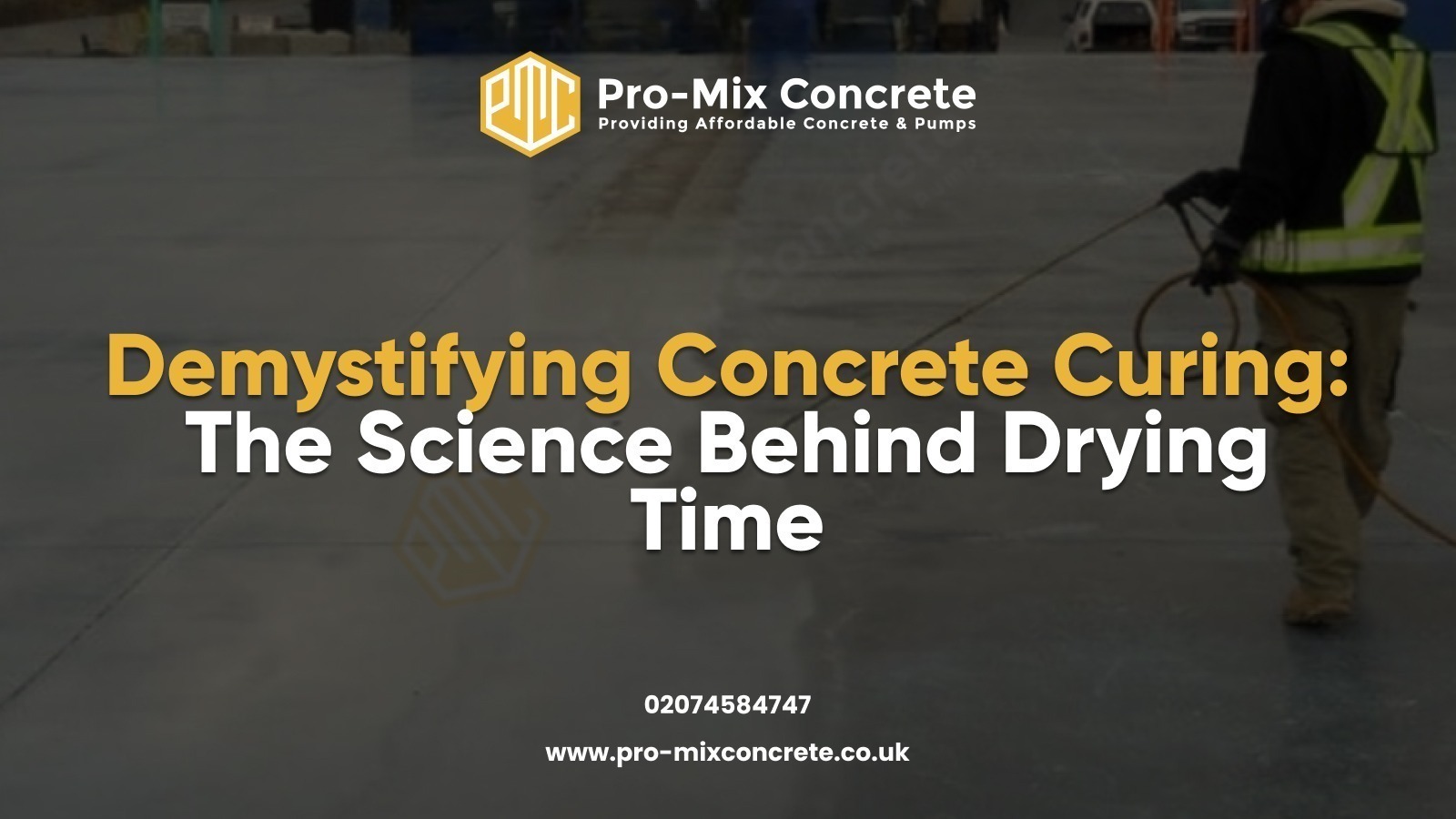Concrete curing is a crucial process that significantly influences the strength of concrete structures. Without proper curing, it can undergo many detrimental changes, such as:
- Developing cracks
- Reduced strength
- Compromised integrity over time
Let’s comprehend the science behind concrete cure time. Besides, it will help you make informed decisions when curing your concrete projects.
Understanding Concrete Cure Time
Concrete cure time is closely related to drying, as concrete gains strength through a chemical reaction called hydration. During hydration, water reacts with cement particles, forming chemical compounds. These compounds bind the aggregate together. Moreover, at the core of concrete curing lies the idea of cure time. This represents the duration needed for concrete to dry and transform into a solid material. Yes, the form we observe in our surroundings.
Proper curing is of paramount importance in the following:
- Achieving optimal strength
- Minimizing cracks in concrete structures
When concrete is not adequately cured, the hydration process may be incomplete. It results in reduced strength and increased permeability. Implementing appropriate curing practices enhances longevity. Additionally, the performance of concrete is boosted.
Setting Vs Curing
Setting and curing are two distinct stages within the overall curing process.
- Setting refers to the early stage when concrete transitions from a liquid state to a solid state. It involves the loss of plasticity and the initial development of strength.
- Curing encompasses the subsequent period during which concrete continues to gain power and develop its properties. Proper curing ensures full cement hydration. This promotes optimal resilience and reduces ruptures.
Factors Affecting Concrete Cure Time
The curing time of concrete is a highly delicate aspect that can be influenced by various things, including:
Composition of Concrete Mix:
The choice of cement, aggregates, and water in the concrete mix directly impacts chemical reactions. Also, it influences the hydration technique. Consequently, it controls the duration required for the concrete to cure.
Water-to-Cement Ratio:
Striking the right balance is vital. Inadequate water hinders hydration. However, excessive water prolongs curing and diminishes concrete strength.
Ambient Conditions:
The environment affects the curing process of concrete.
- Higher temperatures speed up curing.
- Besides, lower temperatures slow it down.
- Humidity affects moisture evaporation.
- Proper airflow aids in moisture removal.
Admixtures and Additives:
Moreover, accelerators and retarders are crucial elements. Curing compounds decrease moisture loss and enhance efficiency. Further, you should use additives per guidelines and project requirements.
Concrete Curing Techniques
Wet curing
The traditional method applies water or moisture to the concrete surface. It prevents:
- Rapid moisture evaporation
- Promotes strength
- Facilitates proper hydration
This is particularly crucial in hot and dry climates.
Moisture-retaining covers
This includes plastic sheets or curing blankets. These covers create a barrier to trap moisture within the concrete. Result? It facilitates controlled curing.
Membrane-Forming Curing
Moreover, these compounds control moisture loss during curing by sealing the concrete. They offer benefits such as moisture retention, protection against temperature fluctuations, UV radiation, and surface cracking.
In hotter climates
Additional measures may be needed to prevent excessive moisture evaporation. It could be more frequent wetting or specialized curing compounds.
In colder environments
Insulation and heating methods may be utilized to maintain the desired temperature for satisfactory curing.
Expected Curing Time for Concrete
Patience is a virtue when it comes to concrete curing. Moreover, allowing ample time for complete concrete curing is necessary. It ensures the concrete is ready to withstand loads and finishing treatments.
Further, prematurely exposing the concrete to excessive stress can lead to the following:
- Cracking
- Deteriorated resilience
- Minimized durability
For the long-term performance of concrete structures, follow recommended curing timelines.
Check out this blog: Why concrete crack?
Bottom Line
The desired properties of concrete can be achieved by implementing proper curing techniques.
When in doubt, consulting professionals can provide valuable guidance and expertise. Additionally, they can provide tailored advice based on your project’s requirements. Experts take into account various factors that particularly influence the final outcome. You can experience excellence in concrete solutions with Ready Mix Concrete London. Also, we possess industry expertise and dedication to delivering superior products. We are your reliable partner for constructing durable structures!
Frequently Asked Questions
Concrete curing time is a topic that generates frequent inquiries from individuals seeking information and guidance. Here are some of those questions as well as their answers:
How long does it take 4 inches of concrete to cure?
Concrete usually reaches its peak strength in approximately 28 days. However, it gains resilience gradually over time. Within the initial days of curing, it attains a significant portion of its strength.
Moreover, to obtain precise information for your project, consult concrete experts or refer to specific guidelines.
How long should concrete cure before putting weight on it?
The time concrete needs to cure before bearing weight varies based on the factors mentioned earlier. As a general guideline:
- It is recommended to let the concrete cure for at least 7 days before exposing it to heavy loads or vehicle traffic.
How long does it take for 3 feet of concrete to cure?
The curing time for 3 feet of concrete can be estimated based on the general guideline of approximately 1 inch per week. Therefore, it may take approximately 36 weeks for 3 feet of concrete to cure.
Does the thickness of the concrete affect the curing time?
Yes, the thickness of the concrete can indeed affect the curing time. The thicker concrete takes longer for moisture to escape. Also, the chemical reactions responsible for curing to occur fully demands time. As a result, the curing process for thicker sections may vary from that of thinner sections. However, this is due to:
- Temperature distribution variations.
- The potential for greater heat generation during hydration.
- Dennis Broderick is the founder and owner of Pro-Mix Concrete Company, a trusted name in ready-mix concrete solutions across the UK. With over 20 years of hands-on experience in the construction and concrete industry, Dennis brings unmatched expertise, practical insights, and a commitment to quality on every project - from residential driveways to large-scale commercial developments.
 BlogDecember 25, 2025The Causes of Wet Concrete and How to Deal With It
BlogDecember 25, 2025The Causes of Wet Concrete and How to Deal With It BlogDecember 24, 2025Transforming Your Garden with Concrete: Ideas, Design Tips, and Inspiration
BlogDecember 24, 2025Transforming Your Garden with Concrete: Ideas, Design Tips, and Inspiration BlogDecember 22, 2025Guide To Concrete Finishes: 9 Different Types of Finishes
BlogDecember 22, 2025Guide To Concrete Finishes: 9 Different Types of Finishes BlogDecember 15, 2025Tips to Hire Concrete Pumps in London
BlogDecember 15, 2025Tips to Hire Concrete Pumps in London





